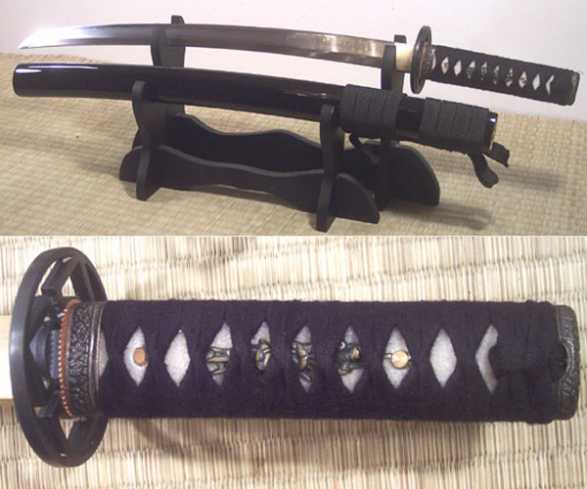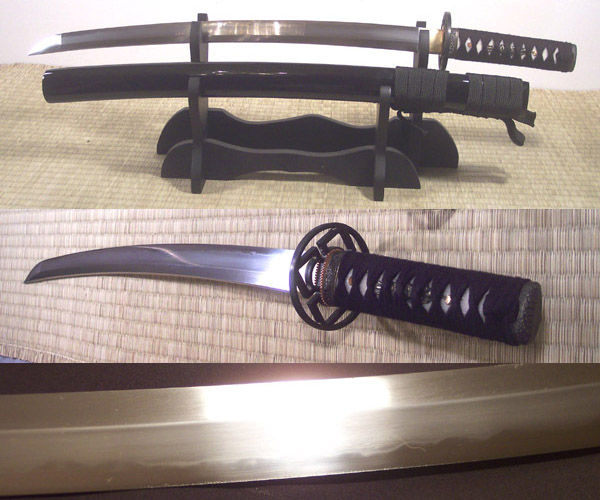Cheness 9260 DH "Kaze" Wakizashi
 Be the first one to write a review
Be the first one to write a reviewDISCONTINUED
SOLD OUT & UNAVAILABLE
Differentially Hardened Companion Sword to the Kaze Katana.
This is the one handed Wakizashi companion sword for our extremely popular Kaze katana. Material and design made to be a matching set with our BROWN ito version of the Kaze Katana... (PLEASE NOTE THAT THE BLACK ITO VERSION PICTURED IS AN EARLIER MODEL, WE WILL BE UPDATING OUR PICS SOON).
Sharpened functional cutter especially effective against traditional targets such as Tatami Omote - it features a 6.5" tsuka and uses double mekugi.
Key feature of this particular Wakizashi is the differentially clay hardened blade with the visible natural hamon as is on our Kaze Katana. As is with our latest version of the Kaze, this sword uses a double mekugi with one being bamboo, and the other being brass for additional tsuka reinforcement – as well as a slightly shallowed same channel and upgraded ito.
Complete your authentic daisho collection with this piece.
MUST READ NOTE REGARDING CHENESS CUTLERY SWORDS
Cheness Cutlery Swords are designed by Martial Artists for Martial Artists. Their goal is and always has been to simply offer an affordable entry level practice sword to beginners in iaido and iaijutsu and when first released in 2005 truly revolutionized the sword market for until that time, there were few to no entry level Katana.
Cheness swords were never meant to be collectors pieces, display pieces, or art sword quality. There are numerous other manufacturers and individual smiths in the industry that serve those needs (click here for our full selection of Japanese swords). The reason being the same as with all other hobbies, refinement will come with a price.
Because of this, certain shortcuts must be taken in the manufacturing process and are NOT considered to be defects. Because of this, we will not accept returns on any swords that have the following features:
- The polish of each sword is a working polish known as a 'Tameshigiri' polish and is somewhere between 400 to 600 grit. As they are handmade and subject to extensive handling, they do get scuff marks and minor stains on the blade and components.
- Each blade is hand hammered, shaped to the eye, and then tempered and quenched. This process causes all types of steel to contract, twist and warp to some degree -with 9260 being one of the hardest steels to keep straight - so you should not expect the blade to be perfectly straight like a lazer. Even if slightly off center or imperfect, it will still cut perform for Tameshigiri and you can be confident in the tempering.
- The blades have considerable hira-niku (meat) on them for heavy cutting and will generally feel somewhat dull to the causal observer. It will not slice paper or shave hair off your arm. It WILL cut tatami mats or bamboo or other targets that were traditionally used to simulate human limbs. With only a little work however, it is quite possible to sharpen it to any degree desired.
- The cotton ito wrap is tight enough for use, but is not going to be as tight as silk or leather. Habaki, Seppa, Fuchigashira, etc are free floating and pinched into place by friction forces like a traditional Katana, but some minor adjustments may be necessary out of the box.
- Mekugi pegs are angled by design to create a wedge and optimize the double mekugi configuration. The bottom peg is made of brass, the top, bamboo which results in an overall stronger design and was recommended by a senior Japanese JSA Sensei.
In short, you should not expect an art sword or something perfect out of the box. You will almost certainly need to make some adjustments or even a complete DIY overhaul (we have many free tutorials on how to do this right here on the main SBG website). But for those of you who don't mind a rough and ready sword, or who wish to take it to a higher level, you will find these blades to be extremely long lasting, tough and worth every penny.
In summary, Cheness puts it like this:
The issues can all be addressed by the end user if they so choose. After receiving the sword, you can adjust the components, add a high-grit diamond paste polish, deburr the blade to slice paper, polish the components, etc. to make it as refined as you choose. However, these are not the features we strive for and should not be expected of the sword out of the box. If a highly refined sword is what you are after, you will either need to be prepared to perform these refinements yourself or should purchase a higher end sword from a different manufacturer.
Please note, as to be expected issues like cracked blades, broken handles, etc are of course subject to our standard warranties and return policies.








